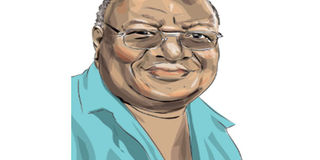Chakava: Selfless custodian of our national conscience

And one of the national legends whose biography offers insights into the history of publishing in post-colonial Africa and education in post-colonial Kenya is Henry Chakava, the chairman of East African Educational Publishers (EAEP), who turned 70 last week. ILLUSTRATION | JOHN NYAGAH
What you need to know:
- And one of the national legends whose biography offers insights into the history of publishing in post-colonial Africa and education in post-colonial Kenya is Henry Chakava, the chairman of East African Educational Publishers (EAEP), who turned 70 last week.
- By connecting us to the history of education and publishing, he serves as a continental legend and a national icon. By being a gatekeeper in a social and intellectual laboratory, Chakava serves as a custodian of our national conscience, inoculating the nation against the unholy trinity of ignorance, poverty and disease.
- It is Chakava who took Ngugi’s first novel in Gikuyu — Caitaani Mutharaba-ini — seriously. This was a time when Ngugi was avoided like a leper.
When evaluating our collective failures and triumphs as a nation, it is often forgotten that our local publishing houses, despite their vulnerability to an examination-sentient market, have invaluably contributed in translating Kenyans to other Kenyans.
The process of the becoming of the Kenyan nation cannot, therefore, be adequately examined without understanding what informs our publishing industry. Neither can we appraise our education system without understanding its relationship with the publishing industry.
And one of the national legends whose biography offers insights into the history of publishing in post-colonial Africa and education in post-colonial Kenya is Henry Chakava, the chairman of East African Educational Publishers (EAEP), who turned 70 last week.
This is also the 40th anniversary of Chakava’s ascent to the chief executive position at the then Heinemann Educational Books.
I was privileged to serve as an apprentice editor at EAEP under his chairmanship, and under the tutelage of veteran editors such as Kiarie Kamau, Barrack Muluka, Jeremy Ng’ang’a, and Lilian Dhahabu.
A few days before I left EAEP to pursue graduate education abroad, I received an unexpected invitation to join Chakava for lunch. Such an invitation from the chairman of a leading company was enough to unarm any part-time employee who was fresh from college. I was nervous but excited.
Nervous because Chakava wears a serious face, which can be intimidating, but it reassuringly thaws into genuine curiosity when he smiles. Excited because I knew his legendary role as a founding publisher on the continent, and his indefatigable role in shaping the East African literary scene.
Chakava was caught up in traffic the day we scheduled our lunch. But what pleasantly surprised me was his humility to call his assistant, requesting her to inform me that he was on his way. He provided details of where he was and the time he estimated to be in the office. This gesture meant so much.
DEMANDING RESPONSIBILITIES
As we walked to a nearby Ethiopian restaurant, I noted Chakava’s ability to understand what is being said with profound clarity, especially because he cares about the person with whom he is conversing. His sonorous voice commands respect, particularly because he is thoughtful.
His capacity to relate and to reach out to me — a young graduate — offers insight into his self-effacement, a characteristic, which makes him, first and foremost, a good human being.
Our conversation over lunch revolved around his experiences and challenges as a publisher, specifically his role in promoting African writers. His advice after lunch? “Once you get to the US, contact Simon Gikandi. He worked with me. He will be a good mentor,” he said.
And I did. Gikandi, a leading literary critic at the prestigious Princeton University, has remained one of my supportive mentors in my documentary research projects on memory and ethics.
My relationship with Chakava has grown stronger, and I pay him a visit every time I am in the country.
If the University of Nairobi is inadequately credited for giving African literature pride of place, even less acknowledged are publishers like Chakava, who were instrumental in building a catalogue upon which literary studies were based. He belongs to that group of founding publishers that Achebe referred to as “conspirators of African Writers Series.”
Realising the demanding responsibilities of the publishing industry in a young nation, Chakava’s careful and dedicated supervision of a growing local industry required foresight and fidelity to local heritages and to the decolonisation project.
NATIONAL CONSCIENCE
If books remain the most effective instruments of disseminating ideas and fostering skills that allow for creative and critical appraisal of humanity and its relation to nature, God and deities, Chakava has remained one of the most vigilant gatekeepers of the ideas they contain.
By connecting us to the history of education and publishing, he serves as a continental legend and a national icon. By being a gatekeeper in a social and intellectual laboratory, Chakava serves as a custodian of our national conscience, inoculating the nation against the unholy trinity of ignorance, poverty and disease.
Still, Chakava’s role has been political. After Ngugi wa Thiong’o was released from detention and could not resume his duties at the University of Nairobi, it is Chakava who gave him a desk in his office. It is Chakava who took Ngugi’s first novel in Gikuyu — Caitaani Mutharaba-ini — seriously. This was a time when Ngugi was avoided like a leper. And yet, Chakava does his noble work quietly. Not many are aware that he was a target of the state’s oppressive mechanisms because of his publishing work. The history of our second national liberation is incomplete without the name of this tactful man of letters.
By remaining faithful to this noble industry of knowledge production, Chakava’s message is simple but profound: Any society that fails to seek knowledge when it does not need it, will not have it when it must use it. Happy 70th birthday, Mzee Chakava!




